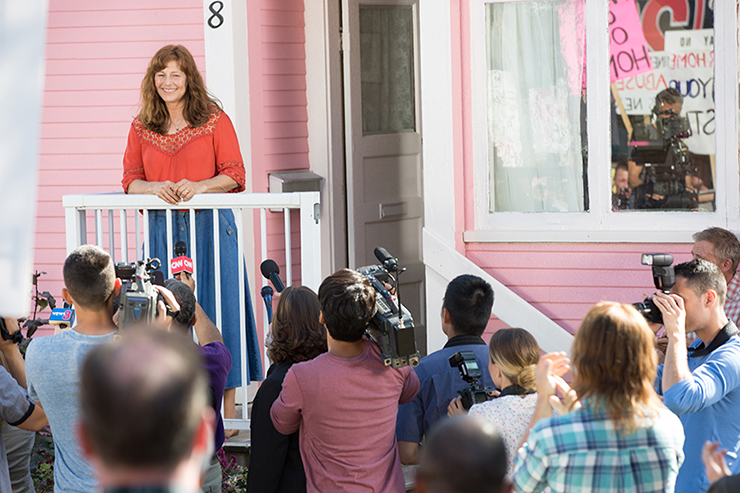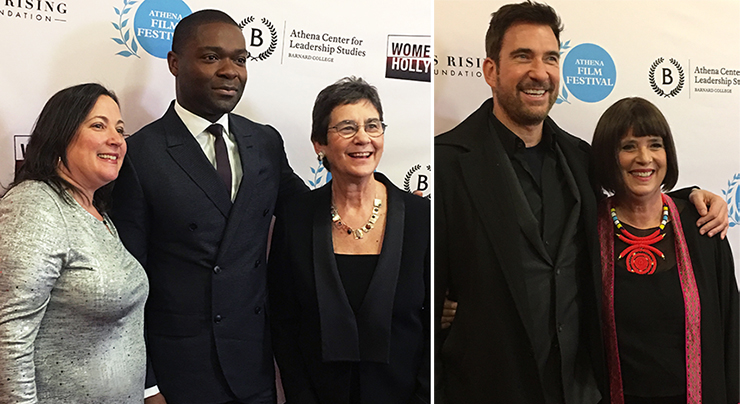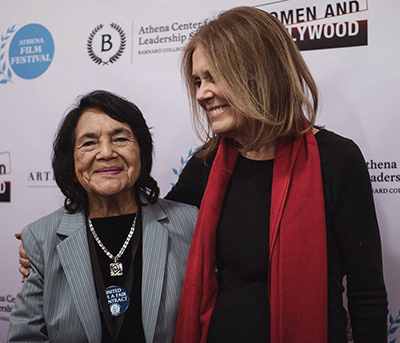ENTER YOUR EMAIL TO RECEIVE OUR WEEKLY NEWSLETTER
Athena Film Festival at Barnard 2017
Make no mistake—these movies spotlight women leaders!
By Grace Lichtenstein

From the documentary City of Joy.
As attendees streamed into theaters and meeting rooms at Barnard College and Columbia University for the seventh annual Athena Film Festival last month, a series of stark statements flashed on the screen, reminders of why we still need a film festival devoted to women:
• 50 percent of movie ticket purchasers were women in 2015
• Of the top 100 grossing films from 2016, just 4 percent were directed by women, down from 7 percent in 2015.
• In 88 years, only four women have been nominated for an Academy Award for best director; only one [Kathrine Bigelow] has won!
• No woman has ever been nominated for an Oscar in cinematography.
The figures, from a variety of sources, have not changed much since Kathryn Kolbert and Melissa Silverstein decided to launch the festival in 2011 after hearing female filmmakers talk about how tough it was to find financing and a platform.
This festival has a specific focus: “women and leadership,” emphasized Silverstein, a co-founder and artistic director. “For a whole weekend, it’s all about the type of women on screen—courageous, bold, audacious, and leaders.”

From the film, Little Pink House.
“I just wanted to keep my home,” said Susette Kelo, a shy New London, CT paramedic whose true story (featuring actress Catherine Keener as Kelo) was dramatized in the opening night feature, Little Pink House. Kelo fought all the way to the U.S. Supreme Court against the state government’s use of eminent domain to condemn her neighborhood and thereby make room for a development that would benefit the pharmaceutical giant Pfizer. “It grew into something bigger” said Kelo. “I was asked to take the lead and I did. And here I am!”
Complete with a call-to-arms town hall on the final night, (see below) the entire festival seemed especially relevant in the wake of the humongous women’s marches worldwide. Several events began with the singing of “I Can’t Keep Quiet,” which has become the de facto anthem of the marches.
Under the auspices of Barnard’s Athena Center for Leadership Studies, directed by Kathryn Kolbert, and Melissa Silverstein’s website, Women in Hollywood, Athena screened 34 films this year over four days. Nearly 6,000 people attended.

Melissa Silverstein, David Oyelowo and Kathryn Kolbert; Dylan McDermott and Eve Ensler.
The screenings drew boisterous crowds of men as well as women, young and old, of every color and sexual orientation, wearing everything from Uggs snowboots and Christian Louboutin leopard heels to African head scarves and pink pussy hats. At one point 350 attendees packed Barnard’s Diana Center theater for Hidden Figures while across the street, hundreds at the Miller Theater whooped and hollered watching the documentary City of Joy, about a safe place in war-torn Congo where sexually abused women are healed and trained to be leaders when they return to their communities.
Other films featured legendary but too-often overlooked labor activist Dolores Huerta; Viola Davis playing a judge in Custody, a film about a child custody battle in New York; Queen of Katwe, featuring a chess prodigy; and The Women’s Balcony, about a rift in an orthodox Jewish community.
Attendees also watched a film about the silent film era and how it was displaced as talkies began and, afterwards, listened to a panel of women filmmakers explaining how despite the changes in film today, it’s still difficult for women to become producers and directors. Other panelists addressed how to negotiate a film contract and how “the female gaze” is a perspective that may be different rom a male one.
The festival promotes screenplays by new talent through its Athena List (Little Pink House by Courtney Moorehead Balaker started this way). Over the years it has honored such leading lights as actor/director Jodie Foster, producer/director Ava DuVernay, former studio head Sherry Lansing, producer/director/actor Paul Feig, and television producer Sheila Nevins. What do they have in common? They’re “people who have blazed trails, broken barriers and more importantly demonstrated their commitment to excellence,” Kolbert said.
This year’s female honorees were Eve Ensler of Vagina Monologues fame, Patricia Riggen, the Mexican-born director of The 33, a drama about the Chilean miners saga, and other films; and executive producer and philanthropist Regina K. Scully.
Eve Ensler was her typical fiery presence, referring to the U.S. president as the “predator in chief.” She founded the nonprofit V-Day 19 years ago with the goal of ending violence and rape against women and girls, yet the practice still continues in Congo as a weapon of war. V-Day also helped finance the site called City of Joy, which opened in Bukavu in 2011. In the documentary about City of Joy Ensler talks, teaches and dances with survivors, doctors and advisors.
“What I’m proud about is that City of Joy was determined by the women of Congo; it was built literally with their hands. They run it, they own it—and they are rising in ways no one could imagine,” she said. They “are now in a revolutionary center where they are being loved and healed and educated. When they leave there they are real grass roots leaders.”
Ensler also heaped praise on Christine Schuler Deschryver, who is in charge of City of Joy, calling the native of Congo “a true grass roots warrior.” For her part, Schuler Deschryver noted that the garden shown in the film as just being planted “is now a garden of Eden.” Since the filming, she said, 849 women had “graduated”—turning “pain into power.”
“They start collectives, become herbal doctors, rally against their local governments, go back to school, and start orphanages,” said Ensler, who was introduced at the awards ceremony by the actor Dylan McDermott, her adopted son.
Patricia Riggen, who attended film school at Columbia, has made five feature films, yet she still feels that discrimination against women “is brutal.” Decision-makers in the industry “don’t trust women, so you’ve got to believe in yourself because nobody else will.” In addition, she said, “We’ve got to collaborate like guys do. When we make it, we’ve got to own it!”
McDermott was not the only man on the Athena awards stage; the festival singled out actor David Oyelowo for its “Leading Man” award, not because he starred as Martin Luther King Jr. in Duvernay’s Selma, but because, in Kolbert’s words, “We feel it is crucial to highlight the men who support women in the industry.”
Oyelowo pointed out that roughly half his movies have been directed by women. “See what happens?” he told the audience, smiling. Turning serious, he added, “it should not be unusual” since 51 percent of the U.S. population is female. “I’m the normal one, folks.”
Women will only forge ahead when producers demand that the lists of directors offered them are at least half women, he said; directors, in turn, are the ones who choose the crews. When he visited the set of Disney’s new DuVernay-directed feature A Wrinkle in Time, Oyelowo said he discovered “the most beautiful utopia of women and men, black, white, everything in between, as you would find on a subway or in a supermarket!”
Enthusiasm was contagious at the Athena Film Festival and it started at the top, with Barnard president Debora Spar. She said it had been a “great joy” to watch it grow and “become a crucial part” of Barnard’s mission. “We have always been about educating women,” she said, but in the “old fashioned academic way”—teaching, books, classes. Now, students meet the “incredible people” who teach how to learn visually. “They’re seeing new kinds of stories represented, and as we hear over and over again, no one can be what they don’t see.“ The film festival offers “students and the world the chance to see what they can be.”
Spar is about to leave Barnard to take on a new role as the president of Lincoln Center. “I’ve never not been in school!” she said with mock-horror. But she made it clear it won’t be that big a shift: The “next generation,” she said, “will learn that art and society will be changed not only by book learning but by learning from the arts.”
. . . . . . . . . . . .
HOW TO PROTEST? ASK THE EXPERTS
What Gloria and Dolores learned from each other, we can learn from them.
 Imagine—Gloria Steinem and Dolores Huerta (at left) have been together on the front lines of protest for more than 50 years.
Imagine—Gloria Steinem and Dolores Huerta (at left) have been together on the front lines of protest for more than 50 years.
“Was it 1966?” Steinem, 82, feminist leader, author and organizer, asked Huerta, 86, who in the early 1960s co-founded the United Farm Workers union with Cesar Chavez and in 2002 started her eponymous community organizing foundation. They appeared together at a “town hall for activists” on the final day of the Athena Film Festival at Barnard College, where the new documentary Dolores was shown in advance of its national theatrical release.
“Where do we go from here?” was the question of the evening. With two leaders of the recent women’s march and several others they discussed how to harness the energy of the global women-led protests of the past month. What stood out was a comradely call and response between two longtime friends.
Dolores: Gloria Steinem helped turn me around in my dark days of not knowing what feminism was. OK? Now, I’m going to say ‘whose got the power?’ and I want you to say ‘We’ve got the power!’ ‘What kind of power?’ ‘Feminist power!’ (Audience responds cheering.)
Gloria: You’ve just witnessed the energy that organized me. She says ‘I organized her?’ Wrong! … Dolores organized me for the Farm Workers, and when you’re organized by her, you stay organized. Because of her, I learned to march in the street; whenever I was picketing, people would say, ‘you’re not a farm worker.’ And I would say, ‘yeah, but I don’t want to eat grapes picked in poverty.’
Dolores: When we came to New York City we had 40 farm workers. Gloria would take me to all these places where I could talk about the grape boycott. [Within a few years across the country] you know how many people stopped buying grapes? Seventeen million!
Gloria: I’ve spent 40 years trying to explain Dolores. Now I don’t have to explain anymore how important she is.
Dolores: [on abortion] Gloria got me there…. I have 11 kids; my daughter Juanita has dogs. She respects my rights, I respect her rights. And support women’s organizations—you don’t have to have a ton of money, but even $20 [helps.] My annual income is $24,000 a year, but I manage to send money to these organizations.
Gloria: Truth of the matter is, each of us knows actions that no one else knows. We could go to our offices and encourage people to tell the one thing we actually know—our salaries. And if we compare them we’ll find out a lot about the problem [of what divides women.]
Dolores: [on children] Take them to the demonstrations, because that’s how they learn….We have a big agenda, but let’s really fight for early childhood education. Women need to be on the front lines.
Juanita Chavez [daughter]: We were on the picket lines as soon as we could take our first steps. We didn’t have a choice! I’m going to quote my mom: ‘You don’t ask your kids if they want to go to the protest, you say, “which color shirt do you want to wear to the protest?”
Dolores: I just want to emphasize, the march on the street has to finish up at the ballot box. OK? Don’t think about 2020, think about 2018. You have to run for office. If you’re a Democrat, join the Democratic party. Go to central committee meetings. We have to get progressives elected, feminists elected, LGBT elected. You can’t do that unless you go to those boring meetings.
Gloria: [Think not just about national politics, but local]—School boards, state legislatures, county commissions. Behave as if everything you do matters. I do think we need to focus on the positive, the joy, the getting out of the crazy idea of hierarchy and being able to really communicate with each other and grow with each other…. This is also [about] dancing!
Carmen Perez and Paola Mendoza, two young Women’s March coordinators, also told the town hall they now had 400 state coordinators and plans for 10 actions within the next 100 days, as well as several general strikes. The first is now set for March 8, “A Day Without Women.” They urged everyone to check the Women’s March Facebook page, Twitter feed (@womensmarch) and website (https://www.womensmarch.com/) for details on these and other actions coming up in their cities and neighborhoods.
(Note: discussion edited and condensed for clarity.)
. . . . . . . . . . . .
Grace Lichtenstein is a former New York Times reporter and bureau chief, the author of six books and a contributor to numerous national magazines. She voted for Hillary Clinton for President.












March 7th, 2017 at 5:20 pm
So important! And so much to do. Reading this great article energized me anew.